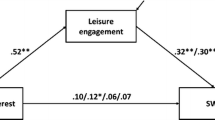Abstract
In this paper, we examined the relationships between motivation to volunteer, serious leisure, and the subjective well-being of volunteers at the 2010 Taipei International Flora Exposition. This study used convenience sampling to recruit a total of 1,094 volunteers. Confirmatory factor analysis and structural equation modeling were conducted for data analysis. The results of this study revealed that serious leisure positively associated with both motivation to volunteer and volunteers’ subjective well-being, while the association between motivation to volunteer and subjective well-being, at a level of 0.5, was not significant. These results suggest that greater attention in future research should be paid to the relationship between motivation to volunteer and volunteers’ subjective well-being, with a focus placed on implications for volunteers’ subjective well-being.

Similar content being viewed by others
References
Adams, K. B., Leibbrandt, S., & Moon, H. (2011). A critical review of the recent literature on activity and well-being in later life. Ageing and Society, 31(4), 683–712.
Beard, J. G., & Ragheb, M. G. (1983). Measuring leisure motives. Journal of Leisure Research, 39, 623–647.
Binder, M., & Freytag, A. (2013). Volunteering, subjective well-being and public policy. Journal of Economic Psychology, 34, 97–119.
Borgonovi, F. (2008). Doing well by doing good. The relationship between formal volunteering and self-reported health and happiness. Social Science and Medicine, 66(11), 2321–2334.
Brajsa-Zganec, A., Merkas, M., & Sverko, I. (2011). Quality of life and leisure activities: How do leisure activities contribute to subjective well-being? Social Indicators Research, 102(1), 81–91.
Burton, K. D., Lydon, J. E., D’Alessandro, D. U., & Koestner, R. (2006). The differential effects of intrinsic and identified motivation on well-being and performance: Prospective, experimental and implicit approaches to self-determination theory. Journal of Personality and Social Psychology, 91, 750–762.
Caldwell, L. L. (2005). Leisure and health: Why is leisure therapeutic? British Journal of Guidance and Counselling, 33, 7–26.
Chalip, L. (2000). Sydney 2000: Volunteers and the organization of the Olympic games: Economic and formative aspects. In M. de Moragas, N. Puig, & A. B. Moreno (Eds.), Proceedings of the symposium on volunteers, global society and the olympic movement Lausanne, international olympic committee (pp. 205–214). Lausanne: International Olympic Committee.
Cini, F., Kruger, S., & Ellis, S. (2013). A model of intrinsic and extrinsic motivations on subjective well-being: The experience of overnight visitors to a national park. Applied Research in Quality of Life, 8(1), 45–61.
Cnaan, R. A., Handy, F., & Wadsworth, M. (1996). Defining who is a volunteer: Conceptual and empirical considerations. Nonprofit and Voluntary Sector Quarterly, 25(3), 364–383.
Davis Smith, J. (1999). Volunteering and social development: A background paper for discussion at an expert group meeting. London: Institute of Volunteering Research.
Degli Antoni, G. (2009). Intrinsic vs. extrinsic motivations to volunteer and social capital formation. KYKLOS, 62(3), 359–370.
Diener, E. (2000). Subjective well-being: The science of happiness and a proposal for a national index. American Psychologist, 55(1), 34–43.
Handy, F., Cnaan, R. A., Brudney, J. L., Ascoli, U., Meijs, L. C. M. P., & Ranade, S. (2000). Public perception of who is a volunteer: An examination of the net-cost approach from a cross-cultural perspective. VOLUNTAS: International Journal of Voluntary and Nonprofit Organizations, 11(1), 45–65.
Heo, J., Lee, Y., McCormick, B. P., & Pedersen, P. M. (2010). Daily experience of serious leisure, flow and subjective well-being of older adults. Leisure Studies, 29(2), 207–225.
Kuo, C. C. (2009). The study among social support, job satisfaction and well-being of sport volunteers: In 2010 national intercollegiate athletic games (Unpublished master’s thesis). Taipei: National Taiwan Normal University.
Lai, S. Y. (2008). The study of the aged volunteers’ subjective well-being (Unpublished master’s thesis). Taipei: National Taiwan Normal University.
Lee, C. Y. (2010). A study of serious leisure and service learning for sport volunteers (Unpublished master’s thesis). Taipei: Municipal College of Physical Education.
Linde, B. D., Kleiber, D., & Monteagudo, M. (2012). Serious leisure and subjective well-being of older residents in northern Spain. Gerontologist, 52(1), 180.
Misener, K., Doherty, A., & Hamm-Kerwin, S. (2010). Learning from the experiences of older adult volunteers in sport: A serious leisure perspective. Journal of Leisure Research, 42(2), 267–289.
Pavot, W., & Diener, E. (2004). The subjective evaluation of well-being in adulthood: Findings and implications. Ageing International, 29, 113–135.
Pi, L. L. (2010). Recruiting strategies, training plans and performance indicators for event volunteers of the 2009 World Games Kaohsiung. Physical Education Journal Society of Physical Education, 43(4), 73–92.
Pilkington, P. D., Windsor, T. D., & Crisp, D. A. (2012). Volunteering and subjective well-being in midlife and older adults: The role of supportive social networks. Journal of Gerontology Series B-Psychological Sciences and Social Sciences, 67(2), 249–260.
Schimmack, U., Radhakrishnan, R., Oishi, S., & Dzokoto, V. (2002). Culture, personality, and subjective well-being: Integrating process models of life satisfaction. Journal of Personality and Social Psychology, 82(4), 582–593.
Stebbins, R. A. (1992). Amateurs, professionals, and serious leisure. Montreal: McGill-Queen’s University.
Stebbins, R. A. (1996). Volunteering: A serious leisure perspective. Nonprofit and Voluntary Sector Quarterly, 25(2), 211–224.
Taipei International Flora Exposition (TIFE). (2011). 2010 Taipei International Flora Exposition official report. Taipei: Linking Publishing Co.
Tesfazghi, E., Martinez, J., & Verplanke, J. (2010). Variability of quality of life at small scales: Addis Ababa, Kirkos Sub-City. Social Indicators Research, 98(1), 73–88.
Tuan, Y. (2005). Can volunteerism be promoted through government administration? Volunteer Service Journal (China) (Special English edition), 16–23.
Vallerand, R. J. (1997). Toward a hierarchical model of intrinsic and extrinsic motivation. In M. P. Zanna (Ed.), Advances in experimental social psychology (pp. 271–360). New York: Academic Press.
Author information
Authors and Affiliations
Corresponding author
Rights and permissions
About this article
Cite this article
Pi, LL., Lin, YH., Chen, CY. et al. Serious Leisure, Motivation to Volunteer and Subjective Well-Being of Volunteers in Recreational Events. Soc Indic Res 119, 1485–1494 (2014). https://doi.org/10.1007/s11205-013-0562-x
Accepted:
Published:
Issue Date:
DOI: https://doi.org/10.1007/s11205-013-0562-x




